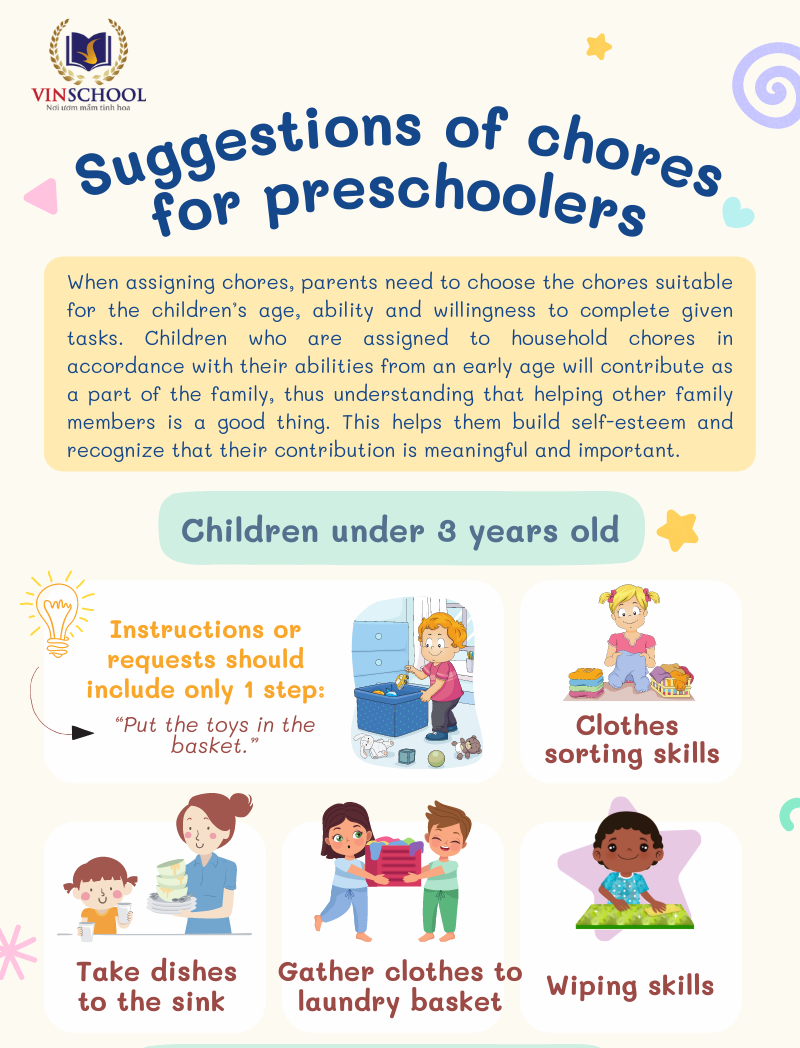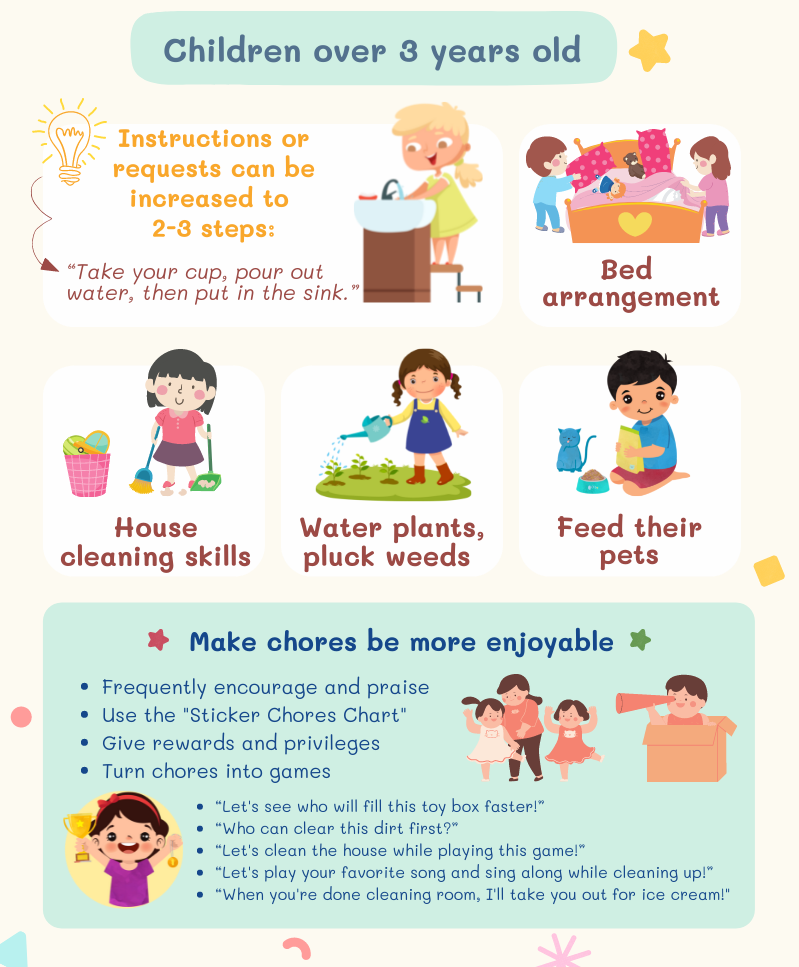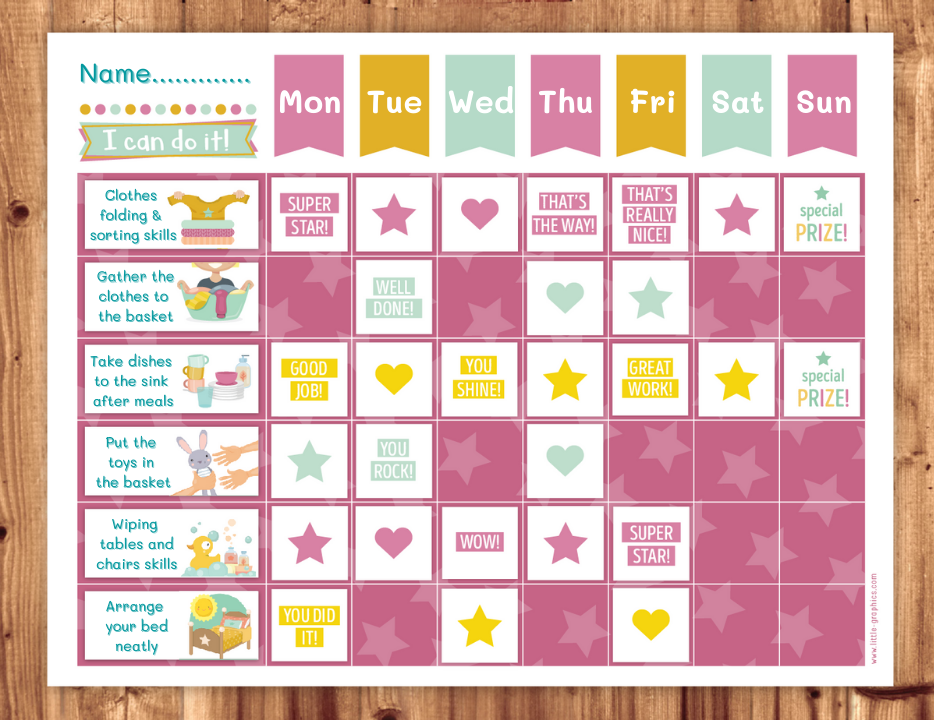Wonderful benefits of assigning household chores to your children
When assigning chores, parents need to choose the chores suitable for the children’s age, ability and willingness to complete given tasks. Children who are assigned to household chores in accordance with their abilities from an early age will contribute as a part of the family, thus understanding that helping other family members is a good thing. This helps them build self-esteem and recognize that their contribution is meaningful and important.
1. Why do children need to be taught to do household chores from early childhood?
When taught to do household chores, the children will be encouraged to:
- Promote independence, sense of responsibility, organizational skills and better time management.
- Build self-esteem and confidence in their abilities, especially when the children complete their tasks and are recognized and encouraged by their parents.
Feel like a part of the family and understand that it is a good thing to help other family members, and that making small contributions is meaningful and important.
Children who are assigned household chores in accordance with their ability at an early age tend to show more positive social behaviour, have more satisfaction in their lives and have better relationships with others. The child will also understand that household chores are not the work of just one person, or just the work of women, but the shared responsibilities and contributions of all members of the family.
2. Choose a chore that is appropriate for the child’s age
Parents need to choose an age-appropriate household chore, given each child’s ability and readiness. This is extremely important and worth noting. If given excessive or complicated tasks, the child will quickly give up, get bored, or may even get upset and stressed.
Suggestions of chores for children under 3:
Children under the age of 3 would love to help their parents with household chores, but of course, the things they can do are very limited. Parents also need to devote time and patience to guide their children step by step. It is important at this age to form the first positive habits to be a stepping stone for the future.
- Simple household chores: Children can participate in household chores from the time they begin to understand and follow adult guidance. For example, children aged 1-2 may follow “One Step Instructions” such as “Put the toys in the basket.” Parents can model and ask their children to do tasks such as:
-
- Tidy up the toys and put them in the boxes
- Take their dishes to the sink after they finish their meal
- Gather their clothes into the laundry basket
- Wiping skills: Children under 3 years of age are in the process of developing gross motor skills and fine motor skills, so household chores with wiping skills will help them practice both of these skills. Parents can teach their children to wipe down hard surfaces such as doors, tables, chairs, and toys. Parents also need to teach children to understand that we don’t use the same towel to clean different areas. For example, a table towel is not used to clean the toilet, or a napkin is not used to clean the table.
- Clothes sorting skills: Children under 3 years of age can start learning about sorting. Clothes sorting not only helps children build their thinking skills and identify colours, but can also become a game for them. So after you pull out your dry clothes, or clear your winter wardrobe, you can instruct your kids to sort their clothes by colour or sort out their personal belongings.
Suggestions of household chores for children over 3 years old
Children of this age are able to follow “3 Step Directions”, such as “Take your cup, pour in extra water, then put it in the sink.” Children are often eager to help their parents, especially with their favourite things to do, to show that they are “grown-up”. At this age, depending on their abilities and interests, there are many basic household chores that they can do without constant supervision. We can offer challenges such as “Let’s see who will fill this toy box faster, who can clear this dirt first!” or “Let’s play your favourite song and try to sing along while cleaning up!”
- Bed arrangement: Although making a bed can be a little difficult for preschoolers, you can help them fold their little blanket, place a pillow neatly, or remove the pillowcase for example. This is also an interesting task to help children remember that keeping the bed clean and tidy will give the children good sleep.
- Developing cleaning skills: Children over 3 years old need constant instruction to develop skills on basic household chores such as packing, tidying up toys, cleaning dishes and cleaning tables. They are also able to fold and put clothes in their backpack or in the closet. In addition, parents can start teaching their children to water plants, pluck weeds in the garden, sweep the house, clean the house, or feed their pets
3. What to do if the child is not yet interested in working at home?
The first thing that interests children is the support of parents when working with them, especially the timely recognition, encouragement, and praise every time they complete the assigned chore. If a child appears to be slightly stubborn and resisting, instead of nagging, parents can give rewards or “privileges,” every time he or she completes the task.
If children are not comfortable with cleaning, this is also an opportunity for parents to teach them that “If you play/study/eat with more tidiness, cleaning will also happen more quickly.” At the same time, this is also an opportunity to teach your child that “We need to take care of what is ours. For example, our family has this house, so we need to take care of it. It’s the same with your toys, books, and tools.”
In addition, parents can make chores a game, work together while playing or singing, or use interesting tools such as the “Sticker Chore Chart” – Housework Sticker Board.
4. “Sticker Chore Chart”
A lot of parents have shared that the “Sticker Chore Chart” is a useful tool to introduce children to chores, at the same time serving as visual reminder to children about their contribution to the family. Children will be more interested in pictures than words, so parents can use this table to attach pictures to household chores. In particular, parents should use sticker awards on the board so that children have more motivation. For example, for every completed job, they will receive a sticker, and convert the collected stickers into small rewards just for them.
Here is a “Chore Chart” template that parents can refer to for their children:
Educating children to work at home is one of the important skills that parents need to teach their children at preschool age, helping them have important and basic life skills needed throughout their lives. Doing household chores will help foster healthy independence and hard work in children, which are also essential qualities to help children succeed in the future. Household chores can sometimes be a small task, but for the children, it can be a big one. Therefore, no matter how parents approach this education, patience, understanding and recognition are the prerequisites for children to grow in these skills.









